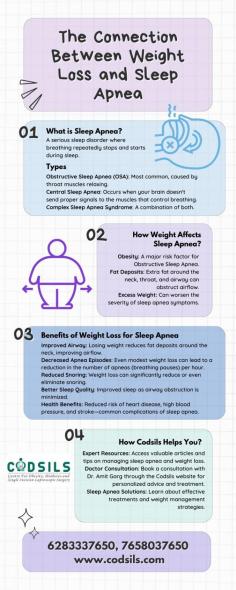
Sleep apnea, a condition characterized by interrupted breathing during sleep, is often linked to excess weight, particularly abdominal fat that can obstruct the airway. Weight loss can be an effective strategy in managing and even reducing the severity of sleep apnea. This article explores how excess weight contributes to the development of sleep apnea, the role of fat deposits in airway obstruction, and how shedding pounds through diet and exercise may alleviate symptoms, improve sleep quality, and reduce the risk of complications associated with sleep apnea. It also discusses the importance of a holistic approach, combining weight management with medical treatments for optimal sleep health
https://www.codsils.com/weight-loss-sleep-apnea/

